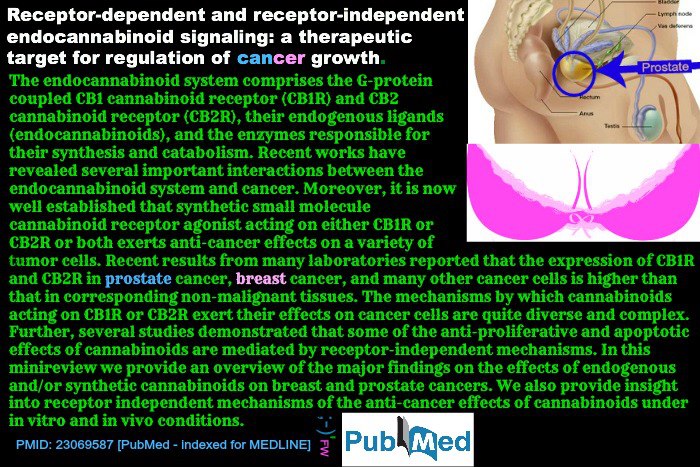 Receptor-dependent and receptor-independent endocannabinoid signaling: a therapeutic target for regulation of cancer growth.
Receptor-dependent and receptor-independent endocannabinoid signaling: a therapeutic target for regulation of cancer growth.
Source
Department of Pharmacology & Toxicology at Brody School of Medicine, East Carolina University Greenville, NC 27834 USA.
Abstract
The endocannabinoid system comprises the G-protein coupled CB1 cannabinoid receptor (CB1R) and CB2cannabinoid receptor (CB2R), their endogenous ligands (endocannabinoids), and the enzymes responsible for their synthesis and catabolism. Recent works have revealed several important interactions between the endocannabinoid system and cancer. Moreover, it is now well established that synthetic small molecule cannabinoid receptor agonist acting on either CB1R or CB2R or both exerts anti-cancer effects on a variety of tumor cells. Recent results from many laboratories reported that the expression of CB1R and CB2R in prostate cancer, breast cancer, and many other cancer cells is higher than that in corresponding non-malignant tissues. The mechanisms by which cannabinoids acting on CB1R or CB2R exert their effects on cancer cells are quite diverse and complex. Further, several studies demonstrated that some of the anti-proliferative and apoptotic effects of cannabinoids are mediated by receptor-independent mechanisms. In this minireview we provide an overview of the major findings on the effects of endogenous and/or synthetic cannabinoids on breast and prostate cancers. We also provide insight into receptor independent mechanisms of the anti-cancer effects of cannabinoids under in vitro and in vivo conditions.
Copyright © 2012 Elsevier Inc. All rights reserved.
Copyright © 2012 Elsevier Inc. All rights reserved.
- PMID:
23069587
[PubMed – indexed for MEDLINE]
Publication Types, MeSH Terms, Substances, Grant Support
Publication Types
MeSH Terms
- Amidohydrolases/antagonists & inhibitors
- Amidohydrolases/physiology
- Animals
- Antineoplastic Agents/pharmacology*
- Cyclooxygenase 2/metabolism
- Endocannabinoids/physiology*
- Humans
- Membrane Microdomains/drug effects
- Monoacylglycerol Lipases/antagonists & inhibitors
- Monoacylglycerol Lipases/metabolism
- Receptors, Cannabinoid/drug effects
- Receptors, Cannabinoid/physiology*
- Signal Transduction/drug effects
- Signal Transduction/physiology*
Substances
- Antineoplastic Agents
- Endocannabinoids
- Receptors, Cannabinoid
- Cyclooxygenase 2
- Monoacylglycerol Lipases
- Amidohydrolases
- fatty-acid amide hydrolase



